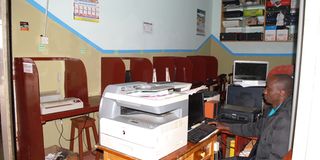Cafes, stationery stores struggle as schools remain shut

Hopeful. Andrew Balitan waits for customers at his internet cafe. PHOTO | WILSON KUTAMBA
With the prolonged lockdown, suppliers of scholastic materials are stuck with stock. Even when students started learning from home, most of the work was done online where there was minimal need for materials such as pens, pencils and books.
Although stationery is consumed by other entities such as offices, churches, and organisations, schools (learning centres) remain outstanding consumers of the stationery products.
According to Joseph Kamya, an internet café operator at Muto complex in Masaka City, since the lockdown started, business has been so slow that he was forced to lay off all three of his workers.
“Although we have since opened our internet cafes, they have remained deserted because most of our customers, some of whom are tertiary students, are still in lockdown. Even if commercial establishments opened, they do not consume as much as they did before lockdown. We are not very hopeful about the partial reopening of schools either,” he says.
He indicated that the government and other stakeholders have continued to look at the education sector in terms of who occupies classrooms and who teaches, leaving out other key players such as service providers.
Out of business
Although the announcement of a partial reopening of schools brought a sigh of relief to some of the stakeholders, others think it has come too late. Ms Winnie Kalyango, an internet café attendant is struggling to live after the lockdown took away her sole source of income. Without savings, to fall back on, she was forced to sell off her valuable household items including her bed and TV set in order to get money for rent and food.
She revealed that she used to supplement her salary with doing course research for students for which she could earn about Shs50,000 every week. “Without the students, the internet café remains empty. It would be unrealistic to expect my boss to pay me a full salary while we spend days without any clients. I hope things get better soon,” she says.
Mr Simon Lutabi, a stationery operator at Kampala University, Masaka Campus, has for the past 10 years depended on the institution for business. With the university closed, he found himself out of business. “I did not sell a single item for five months. Because I had to earn a living somehow, I started giving computer lessons to children,” he says.
The course introduces students to basic computer literacy in computer applications such as Microsoft word, Microsoft PowerPoint, Microsoft database and Microsoft excel for which he charges each student Shs 40,000 for one month.
Forced to diversify
Lutabi currently has 10 students, seven from secondary school and three from primary school.
Ms Doreen Namuyimbwa, the chairperson of Masaka Stationery Operators Association says they are considering petitioning President Museveni through the office of RDC for a financial bailout.
“Government should roll out ways on how to help all service providers and other stakeholders in the education sector because without such sectors, education is incomplete,” says Namuyimbwa. She noted that as the government has come to help other groups such as private teachers, they should also be considered.
Ms Pauline Namawanda , an attendant at Masaka Bookshop in Masaka City reveals that apart from Christians who come to buy Bibles and others who buy some reading materials, the shop is deserted with about five customers a day .
“We just realised that bookshops operate at the mercy of schools and institutions because we have tested our work without them and we making losses,” she says.
Mr Isa Matovu, an educationist says the sector benefits about 20 per cent of other businesses and its closure has had an evident impact on lives of not only employees of the sector but service providers and other partners .
He notes that from shoe sellers, retail shops, boutiques, stationery shops, food vendors, maize making flour companies and other food supply companies are stranded with their products as their customers stay home longer than normal.
“When all the above businesses are at a stand still, it does not only affect people’s incomes but it leaves the national economy in a bad state,” says Matovu.
Who will reopen?
President Museveni last month gave the green light to reopen the schools for candidate classes and finalists in tertiary institutions. Since then, heads of various institutions have been working around the clock to put in place facilities as requested by the ministries of Health and that of Education.
The Ministry of Education rolled out an assessment exercise on October 5, to ascertain the schools’ compliance to SOPs ahead of the return of learners.





